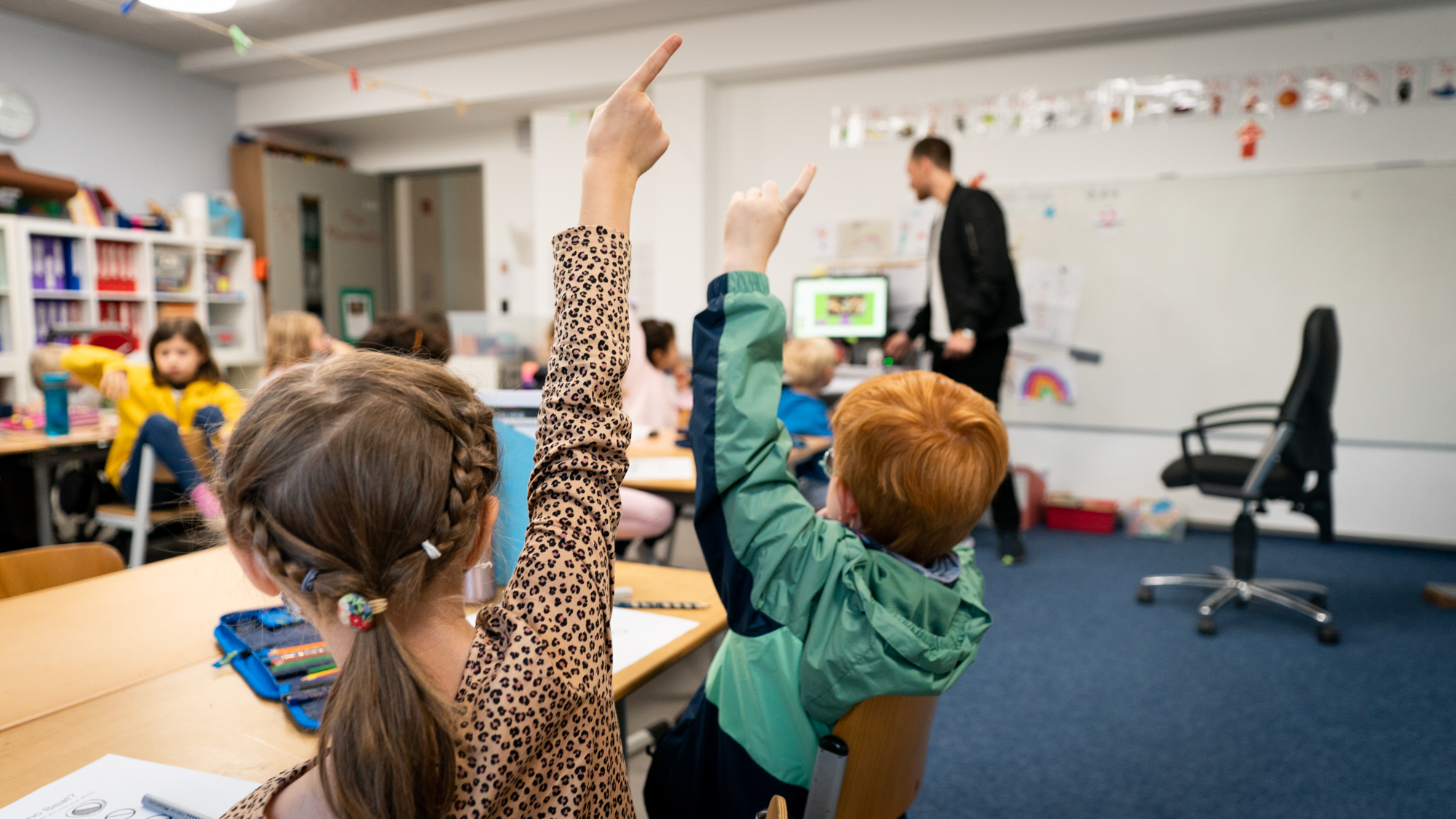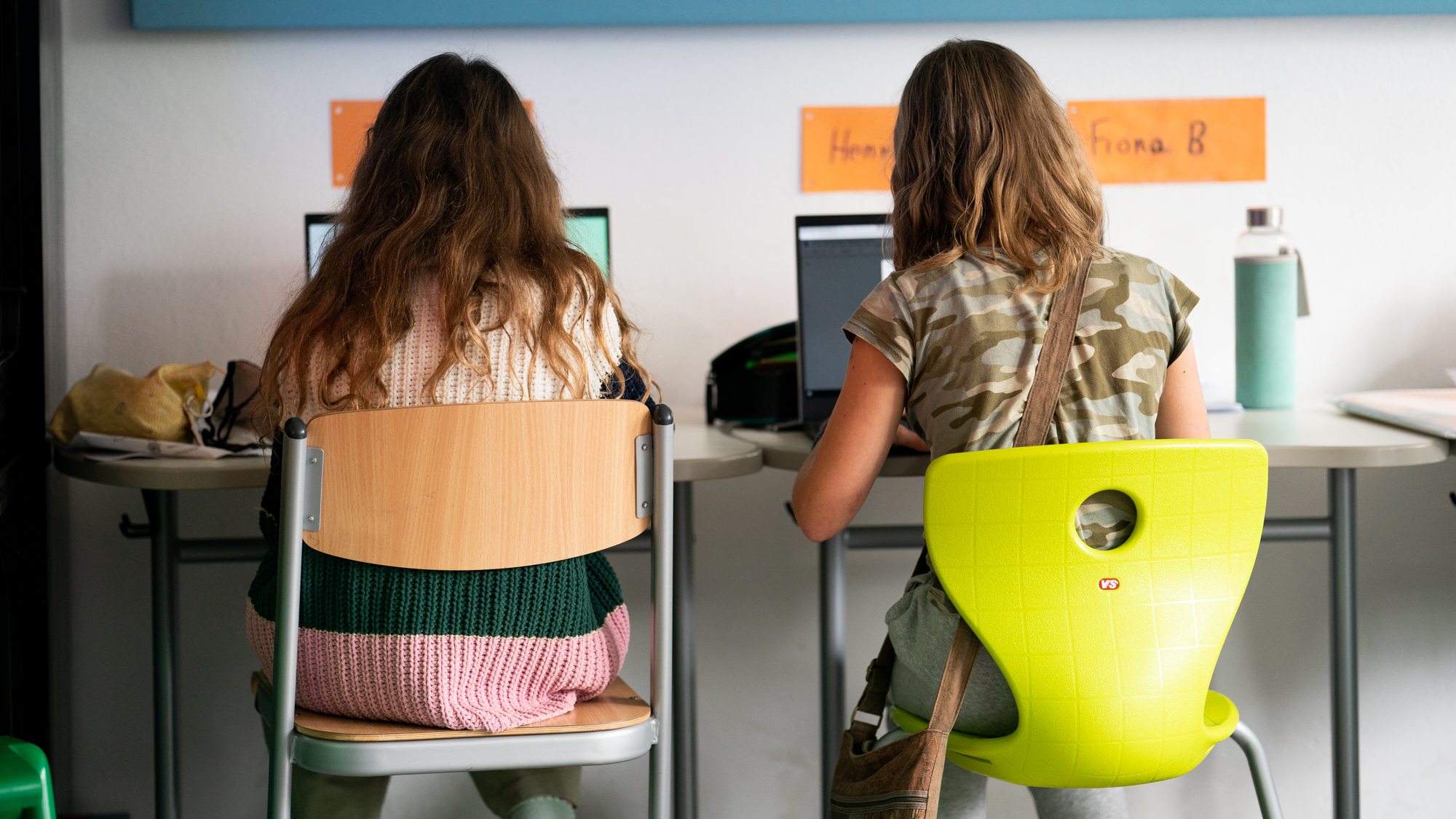
Primary School
Educational Programme
Starting in Grade 1, students are encouraged to become independent learners. Part of this process entails supporting them to follow through on commitments, and guiding them on- managing their time wisely, and reflecting upon their own progress.
How students acquire content and make sense of ideas informs the materials teachers develop , and the tools and assessment measures they use for each student to learn effectively.
Curriculum
The Berlin Bilingual Primary School curriculum takes its framework from the Berlin State Curriculum (Berliner Rahmenlehrplan).
The school day is organised around flexible 90-minute teaching blocks in addition to 45-minute lessons.
Students explore subject areas (Language, Science, Geography) through topics such as Cultural Celebrations (grades 1/2), Early Humans (grades 3/4) and Government and Climate Control (grades 5/6).
All students take English, German, Mathematics, Social-Studies/Science, Music, Physical Education and Art.
Art is taught by the classroom teacher in grades 1/2 and by a subject specialist beginning in Grade 3.
Grade 3 students take one year of swimming instruction.
Grade 4 students take bicycle safety training.
Grade 5 students have the option of adding French or Spanish to their schedule.
Both English and German are taught at a native level.
The goal of the programme is to achieve academic proficiency in preparation for the dual-language qualifications in Secondary School.
More than half of our staff are native speakers in one of the school’s languages and have at least C1 level proficiency in the other.
There are no more than 25 students in our primary school classes.
Student Support
Each Primary School classroom has both a teacher and an Erzieher:in. An Erzieher:in is an educator trained in the social and emotional development of children. They provide continuity throughout the day, including during lunch and recess.
This means students are under the guidance of teachers and Erzieher who reflect upon their development from different perspectives,so not only their cognitive and physical needs are met, but their emotional and social needs too.
Additionally, close communication between school and home means all the adults in students’ lives are aligned to strategically help them thrive.
Some students require more individual attention - be it in learning, developing or maintaining relationships with their peers, taking responsibility for themselves, or coping with setbacks.
Where there is an identified need, BBS is committed to supporting all our students. Our support programme offers the opportunity to meet with a teacher to strengthen English, German, and/or Mathematics skills.
Inklusionserzieher:innen work with students who have physical or mental disabilities, medical conditions such as ADD, ADHD, dyslexia and dyscalculia, while working closely with specialists from the Berlin School Psychological Services and the SIBUZ (Berlin).
The Hort receives state subsidies for the support of students whose particular physical or emotional need requires assistance from an Erzieher:in within the classroom.
1/2 Multi-Age Classes
We believe that in the early years of primary school, a student’s developmental needs are better met in mixed-age classrooms. Students learn from other students and are able to experience themselves in different roles, as both “learner” and “teacher“ as they transition from Grade 1 to Grade 2.
Additionally, individualised instruction allows students to focus on their own learning needs, rather than compare themselves to classmates of the same age.
Socially, the same principle applies. In a multi-age classroom, students can interact with a wider range of classmates and can develop a sense of belonging characterised by different interests and level of maturity.
Multi-age classes at BBS span a range of two years – grades 1 and 2 are taught together.
12 first graders and 12 second graders make up a Grade 1/2 class.
From Grade 3 on, students are taught in year groups, rather than in a mixed-age setting. This is to support the preparation required for secondary school.


The Primary School Day
Daily Schedule: Grades 1-4
7:30
Doors open for students who arrive early. They gather in a Hort room on the ground floor8:30-10:00
First learning block10:00
Students eat a healthy snack in their classroom (grades 1/2) or outside (grades 3/4), then all children go outside to play10:30-12:00
Second learning block12:00-13:00
Lunch cycle. A catered lunch is served in the cafeteria. Students have 30 minutes of playtime outside
| _ | Lunch | Yard |
|---|---|---|
| Grades 1/2 | 12:00 – 12:25 | 12:30 – 12:55 |
| Grades 3/4 | 12:35 – 12:55 | 12:00 – 12:30 |
13:00-13:40
Class13:40-14:30
A 45-minute workshops or 45-minute class. Students choose from a variety of workshops and keep the same workshop for 6-8 weeks. Different workshops take place on different days, allowing for 3 workshops per week14:30-16:00
Third learning block16:00-18:00
Open Hort /Afternoon Hort: students are free to choose a structured activity (for example, choir, karate, or orchestra) or play in one of the after-school rooms13:00
Fridays early pick-up for grades 1-213:40
Fridays early pick-up for grades 3-4
Daily Schedule: Grades 5-6
7:30
Doors open for students who arrive early8:30-10:45
First learning block10:45-11:15
Students eat a healthy snack and go outside for recess11:15-12:45
Second learning block12:45-13:40
A catered lunch is served in the cafeteria. Students have 30 minutes of recess outside13:40-14:30
A 45-minute workshop or 45-minute class. Students choose from a variety of workshops and keep the same workshop for 6-8 weeks. Different workshops take place on different days, allowing 5th and 6th graders 1-2 workshops per week14:30-16:00
Third learning block16:00-18:00
Open Hort /Afternoon Hort. Grades 5 and 6 have their own Hort room after school, if they choose to play indoors.14:30
Fridays – early pick-up for grades 5-6
Primary facility
Located in the Friedrichshain district of Berlin, the primary school is a short walk from Alexanderplatz, and is easily reached by bus, tram and subway.
Our school building is situated on a quiet footpath directly across a park used by the city for traffic safety education. Built in 1968-69 in the East German “Plattenbau” style, the school has four stories. The playground, tended by BBS parents in the garden group, features a football pitch, monkey bars, a swing and trampoline.
Facilities within the school include:
- 12 classrooms
- Art and music rooms
- Library
- Student kitchen
- Cafeteria
- Assembly room
- After-school art room
- Band room
- Pottery workshop
- Woodshop
- Construction room
- Games room
- Movement room
- Role-play room
Outside facilities used regularly:
- Alte Feuerwache (for theater performances)
- Hallenbad Holzmarkt (swimming instruction in Grade 3)
- Various sport facilities throughout Berlin (physical education)
- Volkspark Friedrichshain (physical education and recreational activities)
BBS Traditions and Events at Primary School
Einschulung
In Germany, it is tradition to celebrate children transitioning from daycare (Kita) to school life, with the event known as Einschulung. Each year, the BBS community honors this rite of passage by holding a welcoming ceremony for Grade 1 students and their families. Students are introduced to their teacher and Erzieher, and their soon-to-be classrooms. On this day, it is customary for families to give children a Schültute, a decorated paper cone filled with school supplies, small gifts and, much to the children’s delight, sweets!
Open House
Open House is held in September for families outside of school to tour the school grounds.
Winterfest
Winterfest is held in early December in the school grounds or in a venue nearby. The students perform a song and parents are invited to come along and listen to the performance.
Book Week
Book Week is a week-long celebration of books and reading. Students are invited to explore particular themes through picture books, poetry, and music. Additional events include a read-a-thon and a book sale. Proceeds from the read-a-thon go to the library.
STEAM Week
STEAM Week celebrates science, technology, engineering, art and mathematics. Guest speakers specialised in related fields are invited to speak and share with the students. This includes parents in the BBS community who are specalised in a field of interest.
Sports Day
Shortly before the end of the school year, the entire school participates in traditional and non-traditional games.
Charity Run
Since 2012, BBS has participated annually in Charity Run, in aid of charities selected by the students. This year, we were able to donate 1,800 EUR to Growing Tree Liberia growingtreeliberia.org, an organisation that aids children in Monrovia.
Portfolio Day
Near the end of each school year, parents are invited to their child’s classroom to view their child’s portfolio. Students select representative work from various subjects to put it in their portfolios, which serve to highlight student development and provide students with a lasting memory of their primary school years.
Art Fair
A yearly event of visual and sensory delight where Primary students exhibit their artwork. Parents are invited to see the variety of works on display.
Summer Fair
Organised by parents, the Summer Fair takes place in the school garden. Typically, there are booths selling homemade food and drinks from the different countries represented within our BBS community.
Final Assembly
On the last day of school, the final assembly is the official closing ceremony of the school year. The ceremony is in recognition of the achievement of the students and a goodbye to our graduating Primary students.
